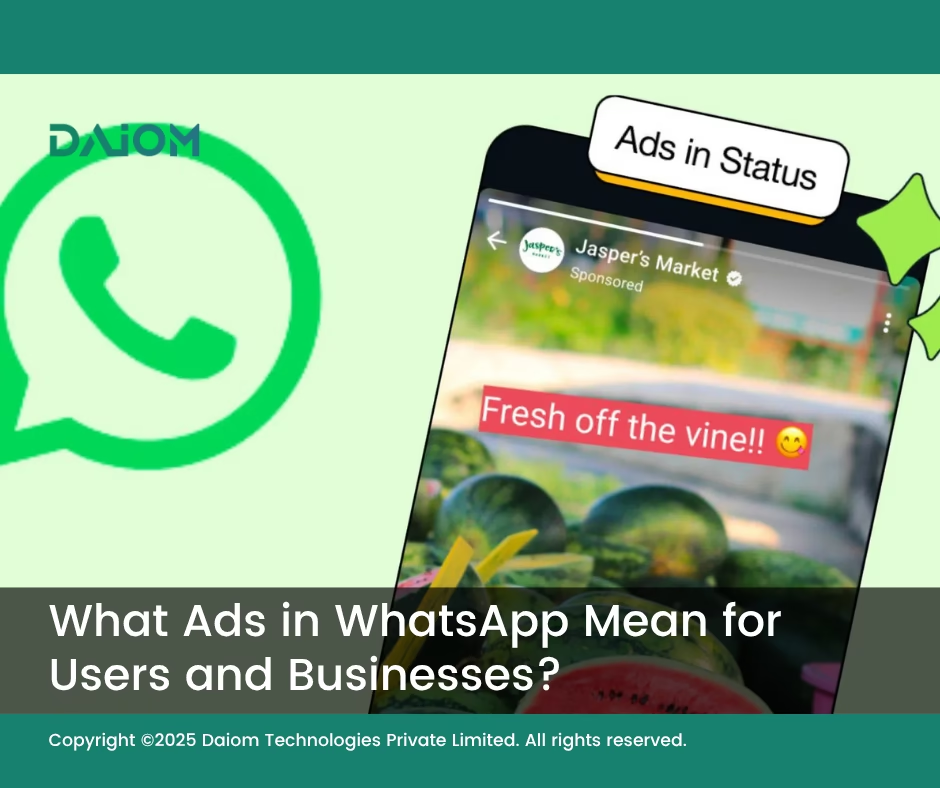Meta bought WhatsApp 10 years ago for around $19 billion — one of the biggest bets the company ever made. And this bet has truly paid off.
WhatsApp not only helped Meta understand customer intent better but also gave access to a lot of interesting user profiles. With pressure on Meta to find new ways to make money beyond Facebook and Instagram, WhatsApp has become super important in its plan.
Today, WhatsApp has over 2 billion monthly active users — making it one of the biggest platforms in the world.
It has already been used for running WhatsApp marketing campaigns, sending service messages, and OTPs. And now, Meta has introduced ads on WhatsApp — this could be a big game-changer.
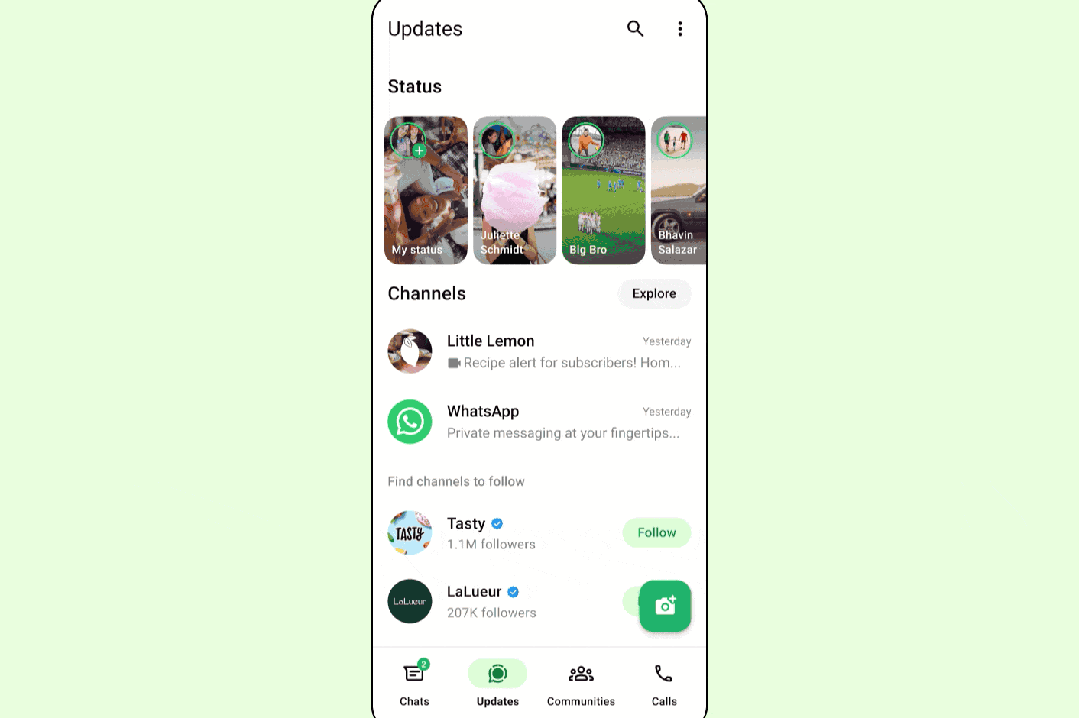
For the first time, businesses can target people beyond their saved contacts, helping brands reach new customers directly on WhatsApp. This opens up a new way for discovery and marketing.
In fact, WhatsApp’s co-founder Jan Koum once said in 2012:
"Remember, when advertising is involved, you the user are the product."
Right now, this feature (ads on WhatsApp) is yet to be rolled out publicly as of June 20, 2025. But we’re looking forward to seeing how this can make a real impact for brands.
If done right, this could open up a whole new way for businesses to reach a wider audience — especially because WhatsApp already has over 2 billion monthly active users.
This is not just another ad space — it’s where real, personal conversations happen. That’s what makes it so interesting. If brands crack the right way to engage here without feeling intrusive, this could become one of the most powerful marketing channels ever.
Let us understand more about it in this blog.
Table of Contents
1. Where Will Ads Appear?
Meta has clearly said that ads will not appear in your personal chats or calls. Instead, they will show up only in WhatsApp’s “Updates” tab—the section where people view Status updates (similar to Instagram Stories) and explore different Channels.

This "Stories/Updates" tab is used by over 1.5 billion people every day, making it a valuable space for businesses to reach users.
Here’s what users can expect to see:
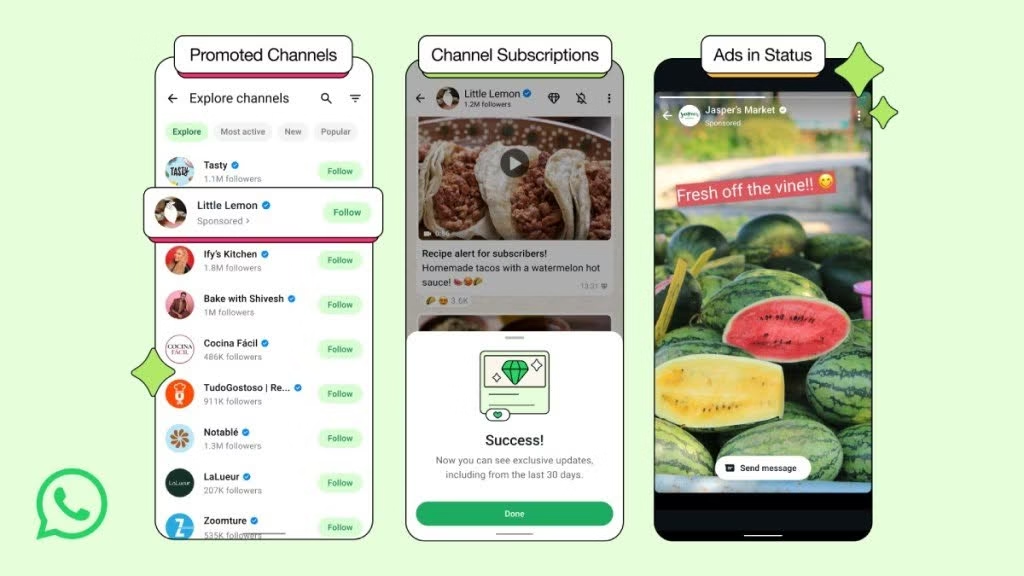
- Sponsored Status Ads – These ads will appear when you scroll through Status updates from your friends or family.
- Promoted Channels – These will pop up when you search for new Channels to follow.
- Channel Subscriptions – Some Channels may offer exclusive content that you can access by paying a monthly fee.
These ads will stay away from your private chats and calls but will become part of the Updates section.
2. Why is WhatsApp Doing This?
Meta, the company that owns WhatsApp, earned over $160 billion in advertising revenue in 2024—mostly from its other platforms like Facebook and Instagram, where ads are everywhere.
But WhatsApp, despite having more than 2 billion users worldwide, has not contributed much to this revenue because the app has always remained ad-free in personal chats.
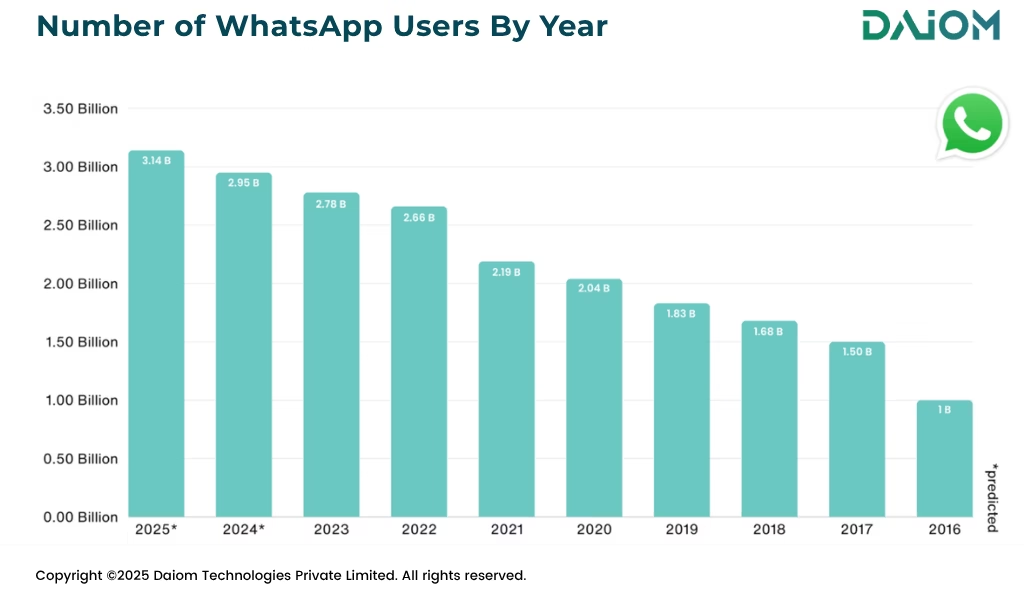
To change this and make WhatsApp more profitable, Meta has now decided to introduce ads in the Updates tab—where people view Status updates and follow Channels. They are also adding paid promotions for Channels and allowing creators to offer exclusive subscription-based content.
This way, Meta can start making money from WhatsApp without disturbing private chats and calls—for now. This is Meta’s way of turning WhatsApp into a business tool while keeping the main chat experience unchanged (at least at the moment).
Also read – How is Meta Approaching India? 3 Things We Learned from Meta India’s Strategy Session!
3. What Data Will Meta Use to Show Ads?
Meta says that the ads you see in WhatsApp’s Updates tab will be “relevant” and “tailored” to your interests. But how will they decide which ads to show you?
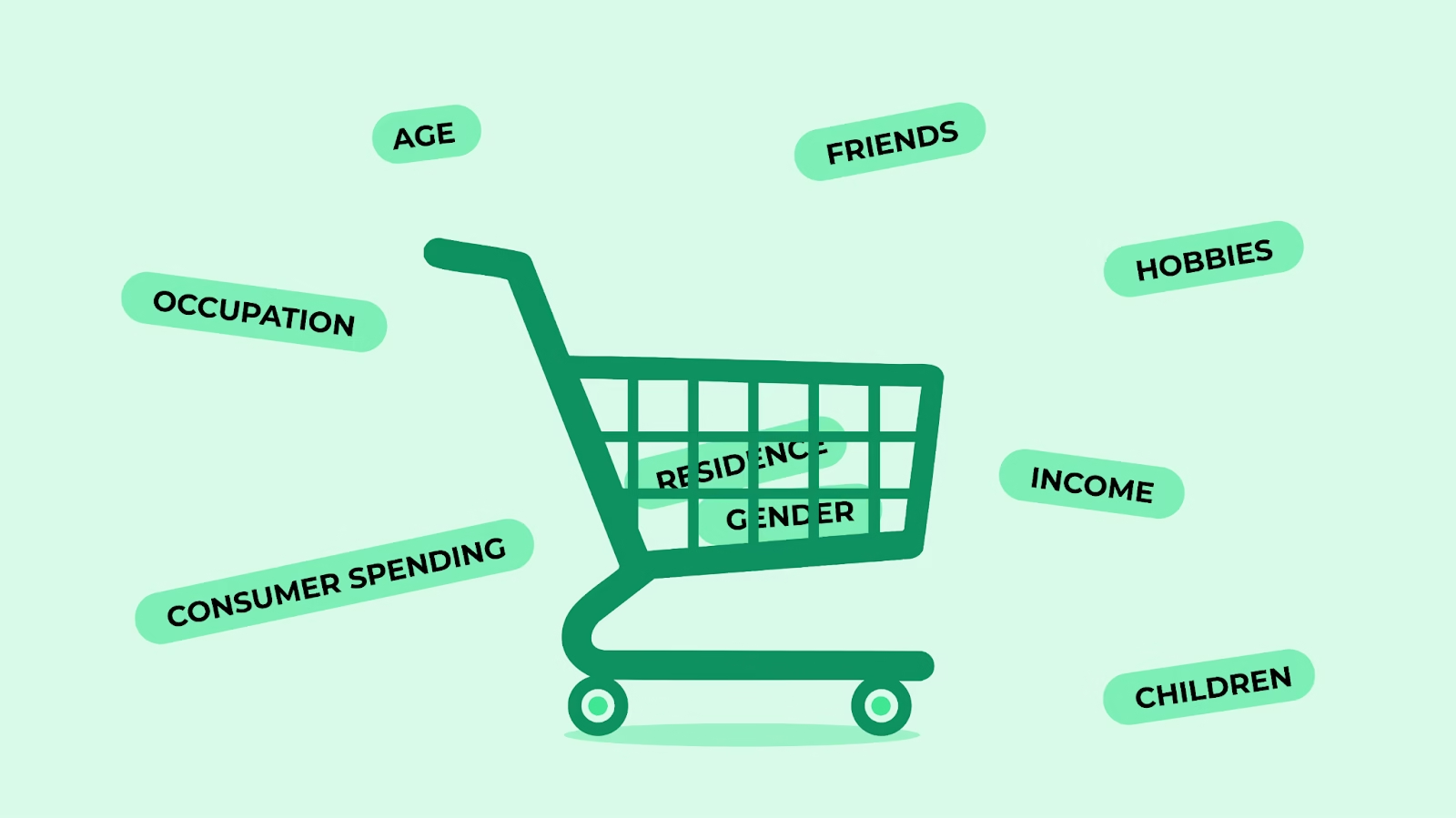
According to Meta, they will use only limited information such as:
- Your country or city – So you may see ads from businesses in your local area.
- Your language – Ads will match the language you use on WhatsApp.
- The Channels you follow – If you follow cooking channels, you may see food-related ads.
- How you interact with ads on other Meta platforms (like Facebook or Instagram) – But only if you have linked your WhatsApp to Meta’s Accounts Center.
Meta has also assured users that:
- Your personal messages, calls, and group chats will stay private. They will not be read or used to show you ads.
- Your phone number will not be shared with advertisers.
However, despite these promises, many users remain unsure. In the past, Meta has made similar privacy promises—only to later introduce changes that worried users about their data security.
So while Meta says they are protecting user privacy for now, people are watching closely to see if these assurances will truly hold in the future.
4. What Does This Change Mean for Businesses?
For companies and brands, this new update in WhatsApp is opening fresh and exciting marketing opportunities that were not available before.
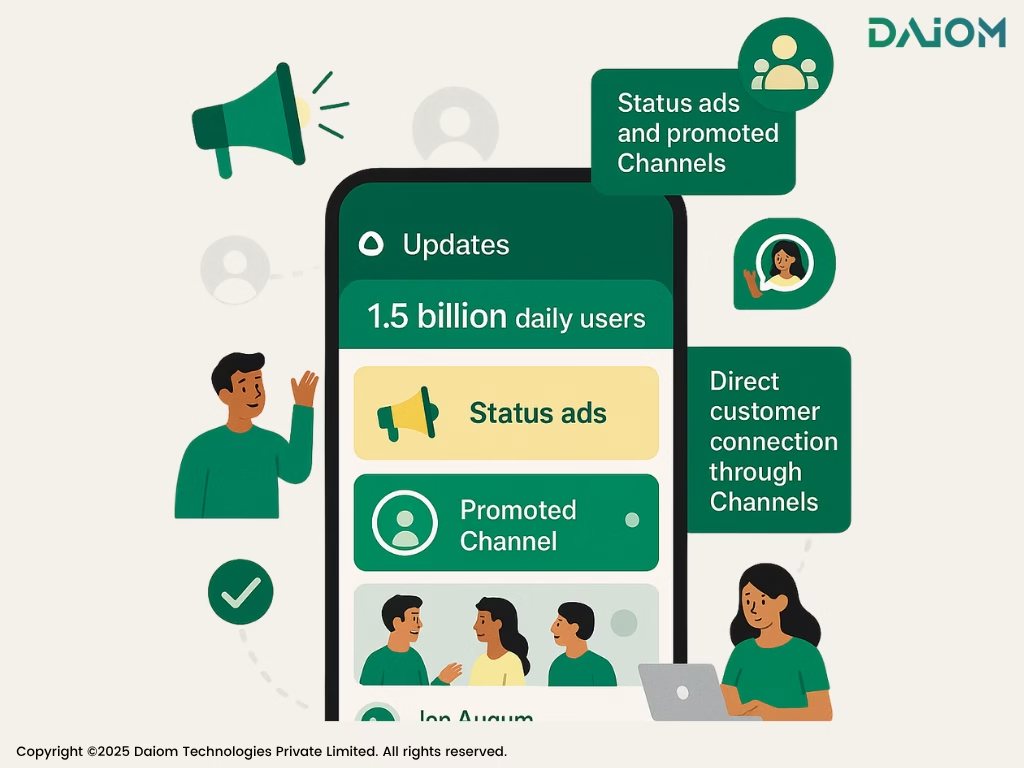
Better Reach to a Huge Audience: WhatsApp’s Updates tab is used by 1.5 billion people every day. This makes it one of the largest spaces for businesses to show ads directly to users. Until now, brands could not advertise on WhatsApp in this way. With this change, companies can reach a much wider audience without interrupting private chats.
New Advertising Options: Businesses will have more ways to promote their products or services. They can:
- Pay to run ads in Status updates, which people view regularly—just like Instagram Stories.
- Promote their own WhatsApp Channels, so that more people can discover and follow them.
Direct Customer Connection: Through these Channels, businesses can share regular posts, updates, offers, and even exclusive paid content with their followers. This allows companies to build a closer, more direct relationship with customers—right inside WhatsApp.
Overall, Meta expects these new ad features to bring in over $10 billion in revenue every year from WhatsApp alone in the future. This is a big opportunity for businesses to tap into WhatsApp’s massive user base while giving Meta a way to make money from the platform.
5. Will This Affect User Trust?
One of the main reasons why billions of people trust WhatsApp is because the app has always kept personal chats private and free from ads or distractions. Users felt safe knowing their messages and calls would never be interrupted by promotions or tracking—unlike platforms like Facebook or Instagram, where ads are everywhere.
Even though Meta has promised that these new ads will only appear in the Updates tab and not in private chats or calls, some users are still worried. Many people feel this could be the beginning of WhatsApp slowly becoming filled with ads—just like what happened on other Meta platforms in the past.
These concerns are understandable.
Users are asking:
- Will ads always stay away from personal messages?
- Will my private data eventually be used more for advertising?
For now, WhatsApp says the core chat experience will not change. But only time will show whether users continue to trust this promise—or start looking for other messaging apps that offer more privacy and fewer ads.
6. Can Users Fully Trust Meta’s Promise?
Meta has officially promised that these new ads will only appear in the Updates tab, where people view Status updates and follow Channels.
They have also assured users that:
- Personal chats, calls, and group messages will remain completely private and ad-free.
- Ads will not interrupt or appear inside your one-on-one or group conversations.
- Users can control and customize some ad settings through the Meta Accounts Center, giving them a say in the type of ads they see across Meta platforms.
But despite these clear promises, many users are still not fully convinced. Their concern comes from past experiences—especially how Facebook and Instagram slowly became more commercial and filled with ads, even after initial reassurances.
While Meta says your chats are safe for now, people are unsure if these promises will hold true in the long run. This uncertainty could affect how much they trust the platform in the future.
7. Conclusion
Right now, this feature is still to be rolled out publicly as of June 20, 2025. But it holds strong potential to change how brands connect with users on WhatsApp.
If done right, it can help businesses reach a wider audience without disturbing the personal, trusted space WhatsApp offers.
It’ll be interesting to see how this shapes the future of marketing and customer engagement on the platform.
Also Read – Highlights From Google I/O ’25 Keynote Event: Transforming Search, Shopping, Innovation, & AI
For more informative content and blog, follow and stay tuned to DAiOM.
Subscribe to our NEWSLETTER!


